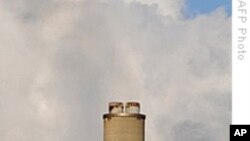A new poll says there has been a significant shift in support for nuclear power in Australia. It has found that almost half of all Aussies believe the technology should be considered as an alternative source of energy to help combat the effects of climate change.
The survey, conducted by the Melbourne Age newspaper and the Nielson polling company, shows a marked change in Australian attitudes to nuclear power, in the last three years. In 2006, only a third of respondents thought the atomic option was a good one. Today almost 50 percent believe it would be a sensible alternative source of energy in a country that is heavily dependent on fossil fuels.
On a per capita basis, Australia is one of the world's worst emitters of greenhouse gases and scientists have warned it is particularly vulnerable to the effects of a shifting climate.
Supporters of nuclear power have insisted it is the only practical low-emissions substitute for coal.
Barry Green - one of Australia's leading nuclear physicists - says the technology is improving all the time.
"The fission community - R&D community - is working very hard to produce advanced reactors that will reduce the radioactive waste problem, which will be safer and so on. And it strikes me that certainly you cannot shut nuclear fission out of the debate at all," said Green.
Green believes that, in decades to come, nuclear fusion - a process where two atomic nuclei fuse together to release large amounts of energy - could play a major role in eventually solving the world's power crisis.
Proponents have insisted that fusion is attractive because tests indicate it will be affordable, safe and environmentally friendly. The fuel the process relies upon deuterium, which is a sustainable resource. However, commercial fusion reactors, could be 50 years away.
At present, nuclear technology revolves around a process called fission, where atoms are split to generate power.
However, critics are worried about the risk of accidents and the awkward issue of safely storing radioactive waste. Opponents also assert that it would take too long for Australia to develop a nuclear power industry.
At the moment, the federal government has no plans to go down the nuclear path, preferring instead to investigate clean-coal technology and a raft of renewable energy sources.
Australia has just one atomic facility, on the outskirts of Sydney, which is used mainly to produce radiopharmaceuticals.
News
Australians Keen to Embrace Nuclear Power
update

<!-- IMAGE -->



